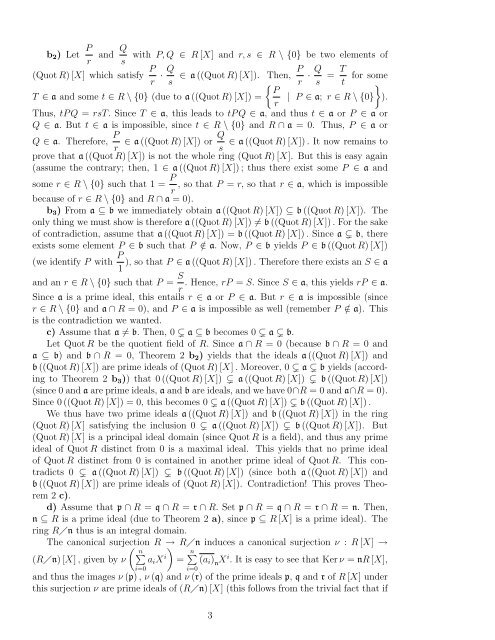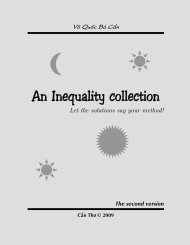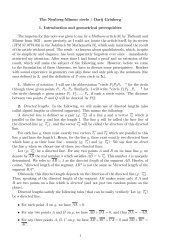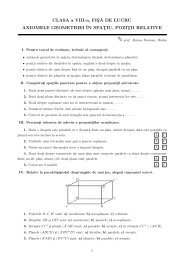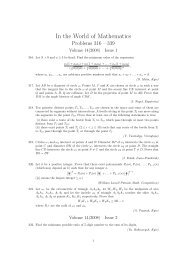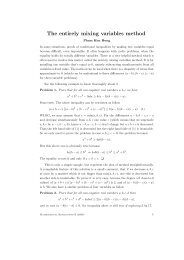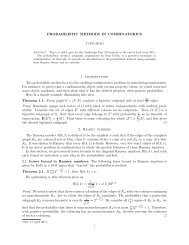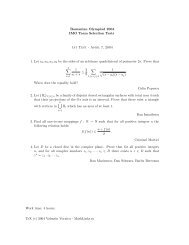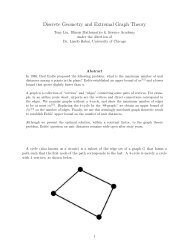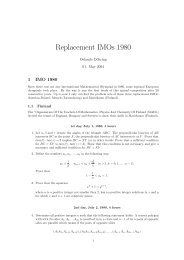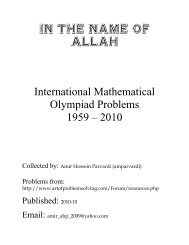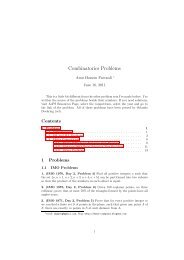Seidenberg's theorems about Krull dimension of polynomial rings ...
Seidenberg's theorems about Krull dimension of polynomial rings ...
Seidenberg's theorems about Krull dimension of polynomial rings ...
Create successful ePaper yourself
Turn your PDF publications into a flip-book with our unique Google optimized e-Paper software.
2 ) Let P r<br />
and Q with P, Q ∈ R [X] and r, s ∈ R \ {0} be two elements <strong>of</strong><br />
s<br />
(Quot R) [X] which satisfy P r · Q<br />
s ∈ a ((Quot R) [X]). Then, P<br />
r · Q<br />
s = T for some<br />
{ t }<br />
P<br />
T ∈ a and some t ∈ R \ {0} (due to a ((Quot R) [X]) =<br />
r | P ∈ a; r ∈ R \ {0} ).<br />
Thus, tP Q = rsT. Since T ∈ a, this leads to tP Q ∈ a, and thus t ∈ a or P ∈ a or<br />
Q ∈ a. But t ∈ a is impossible, since t ∈ R \ {0} and R ∩ a = 0. Thus, P ∈ a or<br />
Q ∈ a. Therefore, P r ∈ a ((Quot R) [X]) or Q ∈ a ((Quot R) [X]) . It now remains to<br />
s<br />
prove that a ((Quot R) [X]) is not the whole ring (Quot R) [X]. But this is easy again<br />
(assume the contrary; then, 1 ∈ a ((Quot R) [X]) ; thus there exist some P ∈ a and<br />
some r ∈ R \ {0} such that 1 = P , so that P = r, so that r ∈ a, which is impossible<br />
r<br />
because <strong>of</strong> r ∈ R \ {0} and R ∩ a = 0).<br />
b 3 ) From a ⊆ b we immediately obtain a ((Quot R) [X]) ⊆ b ((Quot R) [X]). The<br />
only thing we must show is therefore a ((Quot R) [X]) ≠ b ((Quot R) [X]) . For the sake<br />
<strong>of</strong> contradiction, assume that a ((Quot R) [X]) = b ((Quot R) [X]) . Since a b, there<br />
exists some element P ∈ b such that P /∈ a. Now, P ∈ b yields P ∈ b ((Quot R) [X])<br />
(we identify P with P ), so that P ∈ a ((Quot R) [X]) . Therefore there exists an S ∈ a<br />
1<br />
and an r ∈ R \ {0} such that P = S . Hence, rP = S. Since S ∈ a, this yields rP ∈ a.<br />
r<br />
Since a is a prime ideal, this entails r ∈ a or P ∈ a. But r ∈ a is impossible (since<br />
r ∈ R \ {0} and a ∩ R = 0), and P ∈ a is impossible as well (remember P /∈ a). This<br />
is the contradiction we wanted.<br />
c) Assume that a ≠ b. Then, 0 a ⊆ b becomes 0 a b.<br />
Let Quot R be the quotient field <strong>of</strong> R. Since a ∩ R = 0 (because b ∩ R = 0 and<br />
a ⊆ b) and b ∩ R = 0, Theorem 2 b 2 ) yields that the ideals a ((Quot R) [X]) and<br />
b ((Quot R) [X]) are prime ideals <strong>of</strong> (Quot R) [X] . Moreover, 0 a b yields (according<br />
to Theorem 2 b 3 )) that 0 ((Quot R) [X]) a ((Quot R) [X]) b ((Quot R) [X])<br />
(since 0 and a are prime ideals, a and b are ideals, and we have 0∩R = 0 and a∩R = 0).<br />
Since 0 ((Quot R) [X]) = 0, this becomes 0 a ((Quot R) [X]) b ((Quot R) [X]) .<br />
We thus have two prime ideals a ((Quot R) [X]) and b ((Quot R) [X]) in the ring<br />
(Quot R) [X] satisfying the inclusion 0 a ((Quot R) [X]) b ((Quot R) [X]). But<br />
(Quot R) [X] is a principal ideal domain (since Quot R is a field), and thus any prime<br />
ideal <strong>of</strong> Quot R distinct from 0 is a maximal ideal. This yields that no prime ideal<br />
<strong>of</strong> Quot R distinct from 0 is contained in another prime ideal <strong>of</strong> Quot R. This contradicts<br />
0 a ((Quot R) [X]) b ((Quot R) [X]) (since both a ((Quot R) [X]) and<br />
b ((Quot R) [X]) are prime ideals <strong>of</strong> (Quot R) [X]). Contradiction! This proves Theorem<br />
2 c).<br />
d) Assume that p ∩ R = q ∩ R = r ∩ R. Set p ∩ R = q ∩ R = r ∩ R = n. Then,<br />
n ⊆ R is a prime ideal (due to Theorem 2 a), since p ⊆ R [X] is a prime ideal). The<br />
ring Rn thus is an integral domain.<br />
The canonical surjection ( R → Rn induces a canonical surjection ν : R [X] →<br />
n<br />
)<br />
∑ ∑<br />
(Rn) [X] , given by ν a i X i = n (a i ) n<br />
X i . It is easy to see that Ker ν = nR [X],<br />
i=0<br />
i=0<br />
and thus the images ν (p) , ν (q) and ν (r) <strong>of</strong> the prime ideals p, q and r <strong>of</strong> R [X] under<br />
this surjection ν are prime ideals <strong>of</strong> (Rn) [X] (this follows from the trivial fact that if<br />
3


